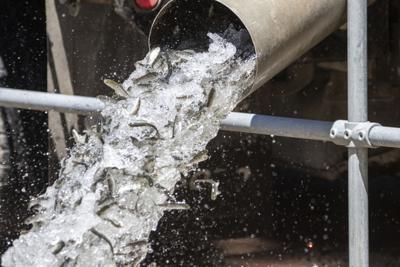As heatwaves sweep the globe and record-breaking temperatures are recorded internationally, we are witnessing the changing climate’s effect on wildlife in real-time.
Effect on animals
In the Salish Sea, across British Columbia and northern Washington, an estimated one billion sea creatures, including mussels, sea stars, barnacles, crabs, clams and snails, died from the extreme heat in June. Scientists have raised concerns of ecosystem collapse, as many of these animals contribute to water filtration and play vital roles in the food web.
Freshwater marine life is also impacted by the heat — specifically salmon. The heat affects salmon in multiple ways. The temperature of the water is higher than eggs can survive in, the oxygen levels are lower due to the heat, droughts have resulted in decreased water levels, and parasites are thriving in these abnormal conditions. Salmon in Washington are altering their migration in search of cooler waters, thousands of baby salmon have been killed by parasites in a California river, and retail prices for salmon are subsequently rising.
Wildlife rehabilitation organizations in Washington and Oregon have taken in dozens of young hawks in the Pacific Northwest. Nearly 50 baby hawks were taken to Blue Mountain Wildlife in Oregon to recover after the fledglings threw themselves from their nests to escape the heat.
Alongside the endangerment of wild animals, livestock are facing the risks of rising temperatures. Cattle farms are dealing with decreased lactation due to heat stress. Cows use their energy for staying cool and lose their appetite, leading to an estimated 25% decrease in milk production — this may cause rising dairy prices. Large numbers of farmed shellfish are dying to the heat; due to the longevity of oyster production cycles, this could impact business for years. Dozens of shellfish farmers have even applied for disaster aid.
Record-breaking temperatures
Hundreds of record temperatures have been shattered worldwide during this historic heatwave. The United States has set more than 500 all-time heat records since June. Canada has broken their national highest temperature three days in a row. Greece is experiencing its worst heatwave in 30 years. Mexico fell just short of an all-time record temperature for the country and instead set one for June. Moscow’s June temperatures are the highest they’ve been since 1901. Helsinki in Finland also shattered their June records, and Sicily reported the highest temperature ever recorded in Europe.
Threats to wildlife
Heatwaves aren’t the only environmental issue posing a danger to wildlife. Habitat fragmentation and loss, ocean acidification, pollution, spread of invasive species, and natural disasters are just a few of the adversities faced by animals internationally as a result of our rapidly changing climate.
The climate crisis is becoming increasingly evident and subsequently more urgent.
In the wise words of Sir David Attenborough, “The truth is: the natural world is changing. And we are totally dependent on that world. It provides our food, water, and air. It is the most precious thing we have and we need to defend it.”




















